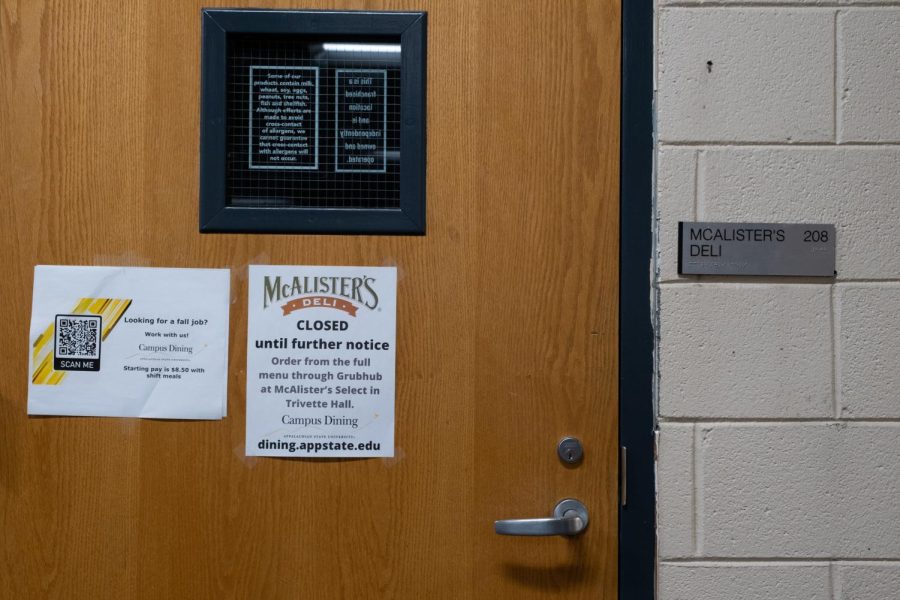Allergy-conscious students left with few options, go hungry
The entrance to the closed McAlister’s Deli in Plemmons Student Union.
January 16, 2023
App State’s Campus Dining seeks to serve all students through informing and assisting students with food allergies involving intolerances and special diets, according to Campus Dining.
Even so, Ember Jones, a sophomore biology major, has to buy most food from the on-campus markets and from Walmart with her own money, “which is not ideal.”
Jones has lived with celiac disease for years and said she cannot eat a bit of gluten, even the smallest amount.
She says she has a hard time securing the necessary dietary accommodations needed for her to safely dine on campus.
“The food has been giving me stomach aches and I am not really sure what to do about it,” Jones said.
Before the start of the school year, she said she met with a registered dietitian on campus and was reassured gluten-free students from previous years have encountered little issue.
Regardless, she said the Weekly 14 meal plan she purchased has not been accommodating her dietary needs, yet she said she sees no alternative.
“It is not like I can just waste my money and stop using my dining hall plan that I paid thousands of dollars for, which sucks,” Jones said.
This fall, Campus Dining debuted the All You Care to Eat meal plan model, which aims to give students the flexibility to choose their own meal plan according to their financial and lifestyle needs.
According to Jones, the switch in plans this fall resulted in fewer allergy-friendly options for students than years prior.
Jones said she originally purchased the all-access dining hall plan, then later made the switch to a lower-tier dining plan after discovering few options. Including in the allergy-friendly station which Jones believes “is lacking” and often runs out of options.
The special worry-free stations at each dining hall include a separate fridge stocked with dairy-free and gluten-friendly foods, as well as its own toaster to prevent cross-contamination, according to Campus Dining.
In order to utilize her dining meal plan, she eats yogurt and fruit from the dining hall for breakfast.
“I am aware that there is a risk of cross-contamination, but I cannot really do anything about that,” Jones said. “I need to eat.”
Megan Gilmore, a junior theater education major, said she believes she has a hard time getting the accommodations she needs. Gilmore said she has more dietary restrictions than the average person. Her main allergens include gluten, dairy and soy, then oregano, thyme, pepper, cinnamon, pork and beef.
Gilmore said she met with the executive chef of Campus Dining, Jules Bott, and found after walking through her options, there were not a lot available.
“In the allergen section they always have chicken and some sort of grain, like rice or quinoa, and a vegetable that’s pretty plain,” Gilmore said. “But he said eating like that every day would not be great.”
With the new style of dining introduced this year, which include meal swipes and dining dollars, Gilmore said she now can eat only from the upper level of Roess Dining Hall, and from Trivette Hall which she said has few options that meet her dietary needs. Dining Dollars are limited per semester and are required at every location except Rivers Street Cafe in Roess Dining Hall and Park Place at the Pond in Trivette Hall, which both use meal swipes.
“I talked to the head of dining and she said next year they are going to try and expand the allergen section for next year, and make things more accessible for finding the ingredients and things,” Gilmore said. “That is helpful for next year, but not helpful for me here, right now.”
Originally left discouraged, Gilmore, who lives on campus and says she lacks the capacity to prepare meals, is now perplexed.
“It was frustrating not knowing what I could do, and now still frustrating knowing there is no way they can help me,” Gilmore said.
Gilmore said she did not receive a solution for her dietary needs at first request, and bounced between Campus Dining and The Office of Disability Resources, finally receiving an answer from dining.
With diagnoses by doctors of irritable bowel syndrome and gastritis, Gilmore said she meets disability eligibility requirements and therefore is eligible to receive necessary accommodations.
“Through working with ODR and dining they exempted me from needing one next semester,” Gilmore said. “Because they have found that they really cannot accommodate me.”
Next semester Gilmore will be without a campus dining hall plan and is unsure how she will compensate. Still, she said she cannot get sick due to cross-contamination.
“If I try to eat from the other sections even if it is gluten-free, or dairy-free, or free from whatever I need, it still has the chance of being cross-contaminated with other things in the kitchen,” Gilmore said.
While Gilmore said the allergy resource staff is helpful, they are sometimes hard to track down. She said the other campus dining hall staff in regard to allergy requests are “not so helpful.”
Elizabeth Riede, executive director of Campus Dining, said Campus Dining staff are trained “internally” in addition to completing training and obtaining a certification through the National Restaurant Association.
Students may schedule a consultation with Bott to discuss allergens and potential cross-contamination. Riede said the consultation is focused on options available to students, as well as how to access information on ingredients and cross-contact during preparation.
“Items marked ‘GF, V, V+’ are not cooked on cross-contact surfaces,” Riede said.
In order to prepare allergen-free foods Campus Dining staff use a “variety of techniques,” Riede said.
In order to continue to accommodate students with special dietary needs and save items for them, signage is posted. The signage includes statements such as “ensure there are items here for students that need them,” Riede said.
Campus Dining advises guests with food allergies, intolerances and special diets to consult a staff member wearing a purple allergen resource lanyard. Those managers and supervisors are trained to share information on potential allergens and ingredients, “as well as provide a comfortable environment for students to request service from backstock or if something needs to be handled in a particular way,” Riede said.
Maranda Maxey, director of the Office of Disability Resources at App State, said ODR works with students to understand their disability and eligibility to receive accommodations through accommodation requests.
“Our team works closely with the Campus Dining team to determine such individualized modifications on a case-by-case basis to ensure students have access to equitable dining options,” Maxey said.















